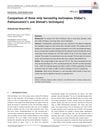 3 citations,
July 2018 in “Journal of Cosmetic Dermatology”
3 citations,
July 2018 in “Journal of Cosmetic Dermatology” Ahmad's sharp scissor technique reduces hair follicle damage without taking more time.
 1 citations,
February 2018 in “Plastic and Aesthetic Research”
1 citations,
February 2018 in “Plastic and Aesthetic Research” The KD spreader makes hair transplants safer and easier, especially for beginners, by reducing damage to hair follicles.
 May 2023 in “JAAD international”
May 2023 in “JAAD international” Minoxidil-dutasteride tattooing can potentially help regrow hair, especially in men who already have some thin hair.
2 citations,
June 2023 in “Journal of clinical medicine” Soy supplements improve various skin conditions and aging signs, with topical use boosting skin barrier function.
 January 2020 in “Medpulse International Journal of General Medicine/Medpulse International Journal of Medicine”
January 2020 in “Medpulse International Journal of General Medicine/Medpulse International Journal of Medicine” Premature graying of hair is often linked with other health issues, but treatment with biotin, zinc, and calcium pantothenate is not very effective.
 15 citations,
June 2011 in “Journal of Ginseng Research”
15 citations,
June 2011 in “Journal of Ginseng Research” Korean Red Ginseng may improve skin condition and reduce allergy markers in atopic dermatitis patients.
 98 citations,
July 2011 in “Fertility and Sterility”
98 citations,
July 2011 in “Fertility and Sterility” An mFG score of 5 or more indicates above-normal hair growth in Southern Chinese women.
 3 citations,
June 2009 in “Journal of The European Academy of Dermatology and Venereology”
3 citations,
June 2009 in “Journal of The European Academy of Dermatology and Venereology” Sparse hairs below frontal hairline can indicate early male balding.
 6 citations,
October 2014 in “Endokrynologia Polska”
6 citations,
October 2014 in “Endokrynologia Polska” Excessive hair growth is much more common in Chinese women with PCOS than in the general population.
 September 2024 in “Egyptian Journal of Dermatology and Venerology”
September 2024 in “Egyptian Journal of Dermatology and Venerology” Combining TRA and latanoprost is most effective for treating localized alopecia areata.
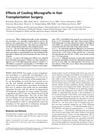 31 citations,
September 1999 in “Dermatologic Surgery”
31 citations,
September 1999 in “Dermatologic Surgery” Cooling hair micrografts during transplantation does not improve their survival or growth.
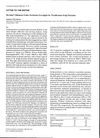 8 citations,
April 2006 in “Acta dermato-venereologica”
8 citations,
April 2006 in “Acta dermato-venereologica” Dovobet ointment used overnight effectively reduces scalp psoriasis severity and itch.
 August 2023 in “Asian journal of pharmaceutical and clinical research”
August 2023 in “Asian journal of pharmaceutical and clinical research” Intense Pulsed Light is an effective and safe hair removal method for people with excessive hair growth.
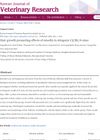 2 citations,
June 2016 in “Korean journal of veterinary research”
2 citations,
June 2016 in “Korean journal of veterinary research” Emodin may help hair grow similarly to minoxidil and could treat baldness.
6 citations,
August 2020 in “Journal of Plastic Reconstructive & Aesthetic Surgery” Home practice solutions using simple materials can help maintain microsurgical skills during lockdowns.
 85 citations,
June 2006 in “Best Practice & Research Clinical Endocrinology & Metabolism”
85 citations,
June 2006 in “Best Practice & Research Clinical Endocrinology & Metabolism” The document concludes that hirsutism is the main sign for diagnosing hyperandrogenism, which requires a detailed patient history and physical exam.
 46 citations,
June 2018 in “American Journal of Clinical Dermatology”
46 citations,
June 2018 in “American Journal of Clinical Dermatology” Hair loss is common in lupus patients and can be permanent or reversible, depending on the type, with various treatments available.
 21 citations,
March 2018 in “Experimental Dermatology”
21 citations,
March 2018 in “Experimental Dermatology” The guide explains how to study human skin fat cells and their tissue, aiming to improve research and medical treatments.
2 citations,
October 2021 in “Skin health and disease” No significant link between male pattern baldness and COVID-19 severity was found.
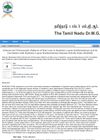
Hair loss in SLE patients is mostly due to chronic telogen effluvium and is linked to moderate disease activity.
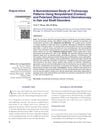 34 citations,
January 2014 in “International Journal of Trichology”
34 citations,
January 2014 in “International Journal of Trichology” Polarized dermoscopy is slightly better than nonpolarized for diagnosing hair disorders, with each method having its own strengths.
 December 2017 in “Huisarts En Wetenschap”
December 2017 in “Huisarts En Wetenschap” Finasteride helps hair growth in early male baldness, but more long-term research needed.
 2 citations,
March 2015 in “Toxicology and Environmental Health Sciences”
2 citations,
March 2015 in “Toxicology and Environmental Health Sciences” Rice bran extract caused moderate skin irritation but no eye irritation, while a diluted essence was not irritating to skin and only slightly to guinea pigs.
 August 2024 in “Clinical Cosmetic and Investigational Dermatology”
August 2024 in “Clinical Cosmetic and Investigational Dermatology” Upadacitinib and narrowband UVB effectively treated a child's vitiligo and alopecia areata.
 14 citations,
November 2014 in “European journal of medicinal chemistry”
14 citations,
November 2014 in “European journal of medicinal chemistry” Researchers found new potential treatments for conditions related to the androgen receptor, like male hormonal contraception, by testing thousands of compounds.
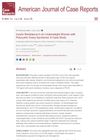 December 2024 in “American Journal of Case Reports”
December 2024 in “American Journal of Case Reports” Underweight women with PCOS can have insulin resistance, and treatment with metformin and dexamethasone can improve symptoms.
 17 citations,
June 2016 in “Croatian Medical Journal”
17 citations,
June 2016 in “Croatian Medical Journal” Patients with chronic graft-versus-host disease often have skin problems like vitiligo and alopecia areata.
 2 citations,
November 2014
2 citations,
November 2014 Common cosmetic dermatology techniques improve skin damaged by the sun and aging.
4 citations,
December 2021 in “Journal of Cosmetic Dermatology” Severe hair loss is linked to worse COVID-19 outcomes, especially in younger men.
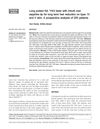 10 citations,
January 2010 in “Indian journal of dermatology, venereology, and leprology”
10 citations,
January 2010 in “Indian journal of dermatology, venereology, and leprology” Long pulsed Nd: YAG laser is safe and effective for long-term hair reduction in darker skin types.


























